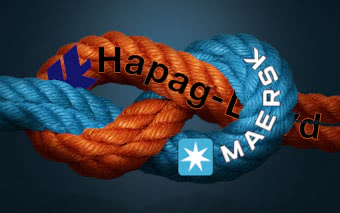
Ahead of disbanding early next year
of the 2M alliance between MSC and Maersk, respectively the first and
world's second containerized shipping carrier that at the beginning
last year announced their decision to cease the
ten-year cooperation (
inforMARE
of
10
July 2014 and
25
January 2023), Denmark's Maersk announced its decision today
to enter into a partnership with Germany's Hapag-Lloyd, fifth
carrier by fleet capacity, specifying that
This, too, will be a long-term operational collaboration
term.
If Maersk embarks on the new adventure once
after the one with MSC, Hapag-Lloyd will have to
abandon the ongoing collaboration with the companies HMM, ONE and
Yang Ming, with whom he cooperates within the THE Alliance consortium,
which is set to expire on 1 April 2030, the date after the
which would be automatically renewed for one year if one or more
partners did not decide otherwise.
 The alliance between Maersk and Hapag-Lloyd, called Gemini
Cooperation, will become operational in February 2025 and will cover
A fleet of about 490 ships with a total hold capacity
3.4 million TEUs, of which 60% were operated by Maersk and
40% from Hapag-Lloyd. The latter will exit THE Alliance
at the end of January 2025.
The alliance between Maersk and Hapag-Lloyd, called Gemini
Cooperation, will become operational in February 2025 and will cover
A fleet of about 490 ships with a total hold capacity
3.4 million TEUs, of which 60% were operated by Maersk and
40% from Hapag-Lloyd. The latter will exit THE Alliance
at the end of January 2025.
Maersk and Hapag-Lloyd announced that the Gemini Cooperation
will cover the Asia-USA West Coast, Asia-USA East Coast,
Asia-Middle East, Asia-Mediterranean, Asia-North Europe, Middle East
Orient-India/Europe and the transatlantic route. The network will be
structured on the basis of 26 main scheduled and integrated services
from a global network of shuttle services based on port hubs of
owned or controlled by the two partners, of which 14 services
shuttles in Europe, four in the Middle East, 13 in Asia and one in the
Gulf of Mexico.
Announcing the new partnership, the two companies
stressed that the aim is to ensure the reliability of the
of ship departure schedules more than 90% once
that the network of services will be fully operational.